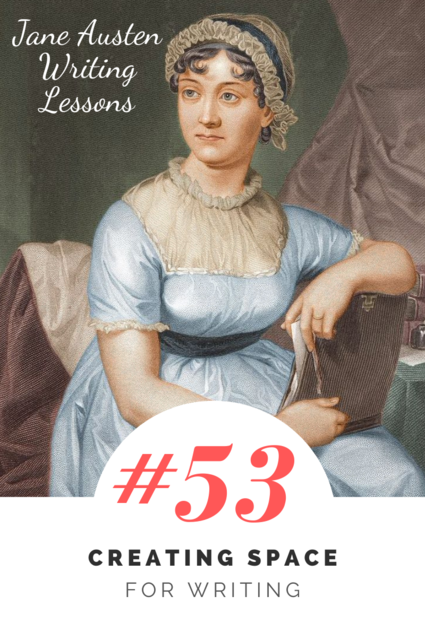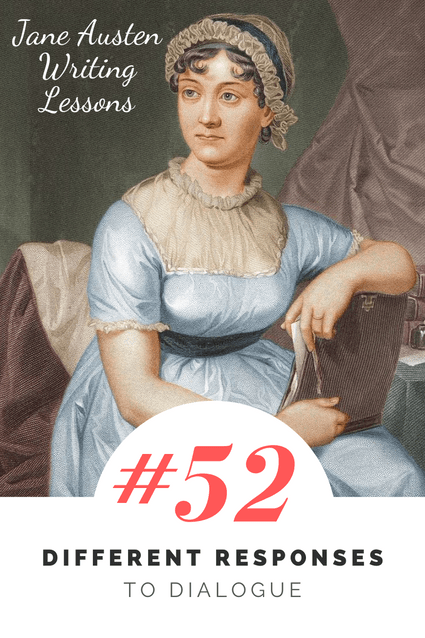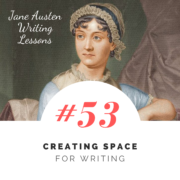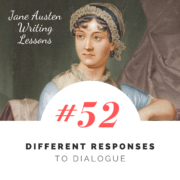Full Sized Blog Element (Big Preview Pic)
#53: Creating Space for Writing
/2 Comments/in Jane Austen Writing Lessons/by Katherine Cowley
One of the most common questions I am asked about my writing is, “When do you write?” I’m also asked, “How do you get writing done with children?” or “How do you prioritize writing when there are other important responsibilities?”
Part of writing is understanding your process, and what it takes for you to be able to write. This is something that Jane Austen seems to have thought a lot about. On September 8, 1816, she wrote a letter to her sister Cassandra which included the following paragraph:
I enjoyed Edward’s company very much, as I said before, and yet I was not sorry when Friday came. It had been a busy week, and I wanted a few days’ quiet and exemption from the thought and contrivancy which any sort of company gives. I often wonder how you can find time for what you do, in addition to the care of the house; and how good Mrs. West could have written such books and collected so many hard words, with all her family cares, is still more a matter of astonishment. Composition seems to me impossible with a head full of joints of mutton and doses of rhubarb.
Company and a busy week made writing more difficult for Jane Austen. She needed time for herself, time for quiet, and time without too many obligations. Especially in her years living in Chawton, Jane’s family did much to lift some of her responsibilities in order to give her the time and the mental space for writing.
Jane also prioritized a physical space. She had her own little table, just for her. And when I attended a guided virtual tour of her Chawton house a few weeks ago, the guide explained that several of the windows by the road were boarded up, so she wouldn’t have all the passerbys on the road looking in on her and distracting her.
In the letter, Jane is astonished by Mrs. West, who balances books and family cares: “Composition seems to me impossible with a head full of joints of mutton and doses of rhubarb.”
Most of us have things we need to balance, whether it’s family obligations, a full or part time job, school, or endless other responsibilities. These things are part of our lives. They’re not going to go away. But are we letting our heads be full of joints of mutton and doses of rhubarb? Or are we finding some time that is just ours, where we can let everything else go and give space for creativity?
When my children were pre-school age, I used nap time and movie time just for writing. It didn’t matter if there was a pile of dishes in the sink or a mess on the floor, appointments to schedule, or seemingly-urgent needs. This was my time, no matter what, and I wouldn’t let it be filled with mutton or rhubarb or anything else.
At other times, I’ve done #5amwritersclub so I could write before my mind filled with any other obligations. I’ve worked in coffeeshops. I’ve prioritized attending writing group.
We all have times, like Jane Austen, where we have obligations that prevent us from writing. But it’s important to make space for writing, whether it’s an hour a day, one evening a month, or a weekend retreat twice a year.
I have a variation on the standard writing exercises today—these are more personal reflections, about your personal writing spaces. But first, a few personal writing notes. I wrote an essay on revising for tone for Women Writers, Women[’s] Books. And yesterday, my second novel was released, The True Confessions of a London Spy! It’s exciting to have a new book to share with readers and friends.

Exercise 1: Spend a few minutes reflecting on the spaces you have for writing in your life. What gives you mental, physical, and creative space for writing. Do you prioritize giving yourself this space? What is something you could change to help create better spaces for writing in your life?
Exercise 2: Speak to the people in your life about your writing. How do you support the people in your life in their goals? How do they support you in your creative endeavors? Would any adjustments help you better support each other.
Exercise 3: Make a list of the priorities in your life, the things that matter to you, the things that pay the bills, the things that are essential. The goal is not to feel guilty that you have other responsibilities that are not writing. The key is to consider what things truly matter to you most, to give yourself credit for those things and to find meaning in those things. Sometimes non-priority things can be eliminated or shifted to give more space for your key priorities.
#52: Different Responses to Dialogue
/0 Comments/in Jane Austen Writing Lessons/by Katherine Cowley
One of the most useful practices when writing dialogue is to consider how different characters will respond to the same line of dialogue in different ways. Whenever, we have certain expectations for how we will be interpreted, for how we would like others to respond. Sometimes, they respond in the way we would expect; other times they respond differently. In a group dialogue, with three or more people, there can be—and often should be—a diverse range of responses to key lines of dialogue.
In Jane Austen’s novel Persuasion, Louisa Musgrove falls on a stone staircase and injures her head. Her illness and her recovery become a talking point in many social gatherings. Not long after the injury, Lady Russell and Anne Elliot call upon the Crofts. Jane Austen describes the conversation between Lady Russell, Anne, and Mrs. Croft, as Admiral Croft observes and then adds his perspective on the matter:
As to the sad catastrophe itself, it could be canvassed only in one style by a couple of steady, sensible women, whose judgments had to work on ascertained events; and it was perfectly decided that it had been the consequence of much thoughtfulness and much imprudence; that its effects were most alarming, and that it was frightful to think, how long Miss Musgrove’s recovery might yet be doubtful, and how liable she would still remain to suffer from the concussion hereafter!—The Admiral wound it all up summarily by exclaiming,
“Ay, a very bad business indeed.—A new sort of way this, for a young fellow to be making love, by breaking his mistress’s head!—is not it, Miss Elliot?—This is breaking a head and giving a plaister truly!”
Admiral Croft’s manners were not quite of the tone to suit Lady Russell, but they delighted Anne. His goodness of heart and simplicity of character were irresistible.
Lady Russell does not approve of Admiral Croft’s statement or the manner in which he has said it—to her, Louisa’s injury is not a laughing manner. This is not a formal, sophisticated way to speak of it. Yet we read that this response “delighted Anne.” It is not that Anne disregards propriety, but rather that she sees a place for levity, and that she understands his goodness and his character and how that informs his statement.
In a previous Jane Austen Writing Lesson, I discussed how groups of characters are not monoliths: even among very similar characters, there should be a range of perspectives and attributes.
The same is true with how characters respond to dialogue.
Factors that influence how a character responds to dialogue:
Their personality
Their expectations
Their knowledge of, and relationship with, the speaker
Their understanding of the situation and topic
Their wants, needs, and goals
Their inherent biases
In Mansfield Park, a group of individuals, which includes most of the main characters, is given a tour of the Rushworth home by Mrs. Rushworth. Mrs. Rushworth show them the chapel—which disappoints Fanny for its lack of grandeur—and explains:
“It is a handsome chapel, and was formerly in constant use both morning and evening. Prayers were always read in it by the domestic chaplain, within the memory of many. But the late Mr. Rushworth left it off.”
Miss Crawford interprets this dialogue very differently than Fanny:
“Every generation has its improvements,” said Miss Crawford, with a smile, to Edmund….
“It is a pity,” cried Fanny, “that the custom should have been discontinued. It was a valuable part of former times. There is something in a chapel and chaplain so much in character with a great house, with one’s ideas of what such a household should be! A whole family assembling regularly for the purpose of prayer is fine!”
The differences in their reactions to Mrs. Rushworth’s dialogue reveal much about Miss Crawford and Fanny. Fanny is pious and has grand visions of morality, while Miss Crawford is more cynical.
Yet the dialogue does not stop there—each of the characters continue to bring themselves to the discussion. Fanny’s statement is immediately interpreted in two different ways:
“Very fine indeed!” said Miss Crawford, laughing. “It must do the heads of the family a great deal of good to force all the poor housemaids and footmen to leave business and pleasure, and say their prayers here twice a day, while they are inventing excuses themselves for staying away.”
“That is hardly Fanny’s idea of a family assembling,” said Edmund. “If the master and mistress do not attend themselves, there must be more harm than good in the custom.”
Miss Crawford’s interpretation shows an awareness of class disparity and the way in which upper class people often force their morality on those in their employ while disregarding the same principles of morality for themselves. It’s both a clever and an insightful comment. And it also treats Fanny’s perspective as inadequate and uninformed.
Edmund’s response defends Fanny, in part because of the long-established relationship that he has with Fanny, and his understanding of her meaning. But his response also stems from the fact that he intends to become a clergyman and also sees value in religious practices.
Later on in the scene, Edmund’s sister Julia tells a joke about Maria and Mr. Rushworth being ready for marriage, and tells Edmund:
“My dear Edmund, if you were but in orders now, you might perform the ceremony directly.”
Miss Crawford is shocked by this new information:
“Ordained!” said Miss Crawford; “what, are you to be a clergyman?”
“Yes; I shall take orders soon after my father’s return—probably at Christmas.”
Miss Crawford, rallying her spirits, and recovering her complexion, replied only, “If I had known this before, I would have spoken of the cloth with more respect,” and turned the subject.
This new knowledge makes Miss Crawford wish that she had responded differently to the previous lines of dialogue. She was trying to impress Edmund with her insights and clever way of speaking, but was missing information that would have shifted her response.
In writing group dialogue, it is useful to consider that different characters will often respond to the same passage of dialogue in different ways. Incorporating these differences can richer dialogue with more tension and movement.


Exercise 1: The Response Game
Choose 5 characters. These could be characters you’ve already written, characters from one of your favorite books or films (for example, Mr. Darcy, Mr. Bingley, Miss Caroline Bingley, Elizabeth Bennet, and Jane Bennet), or characters that are inspired by people in your life.
Now watch a trailer for a new or upcoming movie. How would each of the five characters respond differently to this trailer?
Craft a 2-3 sentence response for each of the characters to this movie trailer.
Exercise 2: A Practice Scene
Write a brief scene with three characters. Have one of the characters say a line of dialogue which is interpreted differently by the characters. something, and then the other two characters respond in different manners. The responses can be largely internal or largely external; they can be in the form of dialogue, action, or introspection. The characters may also have the same external reaction or action, but for different reasons.
Exercise 3: Dialogue Analysis and Revision
Part 1: Analyze a passage of dialogue in a published short story or novel. The passage of dialogue should include at least three characters. Consider when characters respond differently to the same line of dialogue, and what motivates this response.
Part 2: Revise a scene you have written which includes dialogue between at least three characters. Are there places where you could strengthen the passage by having the characters respond differently to the dialogue?




